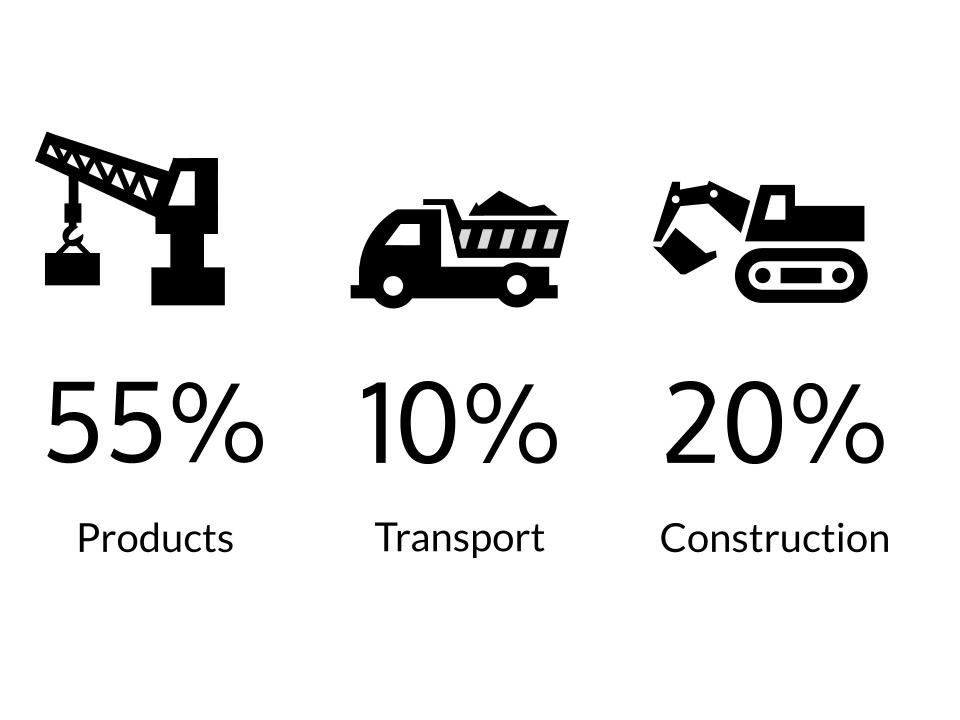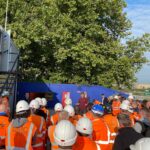The construction industry is one of the largest emitters of carbon and other harmful emissions globally, with 2050 being a crucial target year. According to the Global Status Report (2017), construction activities together amount to 36% of global final energy use and 39% of energy-related carbon dioxide [1] . Therefore, our industry is at the vanguard of leading the world toward decarbonisation and a more sustainable planet for future generations.
However, it is not all doom and gloom; despite erratic annual variations, the carbon footprint of the built environment has reduced in the UK since 1990. Two of the most significant contributing factors were insulation installation rates between 2008 and 2012 and decarbonisation of grid electricity both contributed to this downward trend. So, despite the myriad of challenges we face with embodied carbon emissions, the potential for industry and infrastructure to dramatically reduce carbon emissions is already proven.
At the coalface of every project, addressing carbon footprint is often pushed to the bottom of the agenda when imminent deadlines and more recently, the immediate added stresses of Covid-19 uncertainties being at the forefront. A huge task and daunting deadline as well as a busy to do list makes it all too easy to neglect our individual and collective duty towards reducing our carbon footprint.
Feeling carbon emission guilty and committed to our values as a proactive solution company, we decided that it was no longer acceptable to have vague plans to be better, we had to be clear on what needed to be done. Focusing on applying our skills in leadership, procurement and innovation to set ambitious targets. That can then be filtered down into binding policies that then have a wider impact through the whole carbon supply chain. In turn spurring innovation.
As 10% of new construction carbon emissions are transport based, we decided our first major action was to make the leap to an all-electric fleet. Like many in the construction industry we were avowed petrolheads at innDex, our marketing team particularly are diehard motor racing fans! But even the most sceptical amongst us has been delighted with the conversion and our first actionable steps to reducing the Carbon Crisis. There are clear economic benefits from reducing carbon in construction. In our instance, electric vehicles are better for the planet and are cheaper to operate and maintain.

Data collection is the central plank to leadership; what you cannot measure you cannot manage, and what you cannot manage you cannot change. Using our automated analysis of your commute/travel data, you can drive efficiency and reduce your carbon footprint. This will allow you to efficiently strategies efficiencies. We need to embed changed behaviours, using common metrics to evidence leadership and improvement.
We know that replacing your fleet of cars might not be feasible for you, right now, but our digital tool can be used immediately to efficiently calculate different aspects of your project carbon footprint. An idea: where design cannot change, the carbon footprint could then be offset with carbon-absorbing woodland or even in lieu of your annual office party… Back to the 2020 ‘Covid19’ Zoom Christmas parties!
It has really galvanised the team here and has really driven (literally) us to push for further solutions to the carbon challenge. We are committed to demystifying the challenge of addressing embodied carbon emissions, through breaking down complex terminology and creating a common carbon language onsite and at the office. That sets a consensus-built definition for net-zero embodied carbon and makes us all accountable in the carbon challenge.
Transition towards mainstream net-zero carbon standards requires immediate action to achieve greater awareness, innovation, improved processes to calculate, track and report embodied carbon. Approaches such as maximising the use of existing assets, promoting responsibility and seeking new circular business models that reduce reliance on carbon intensive raw materials are also needed, we look forward to finding new solutions with you; we want you to demand more and set more ambitious targets, and we’ll promise to keep you updated with our next moves in the Carbon e-mission.
SHARE THIS ARTICLE
RECENT POSTS
-
 Network Effects: The Answer to Digital Skepticism in Construction?November 22, 2022/0 Comments
Network Effects: The Answer to Digital Skepticism in Construction?November 22, 2022/0 Comments -
 5 Emerging ConTech Trends You NEED to know for 2023January 11, 2023/
5 Emerging ConTech Trends You NEED to know for 2023January 11, 2023/ -
 Let’s Eliminate Fatigue in ConstructionMay 29, 2020/
Let’s Eliminate Fatigue in ConstructionMay 29, 2020/





